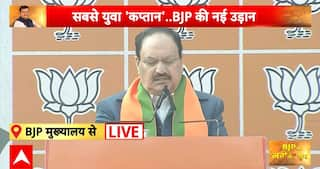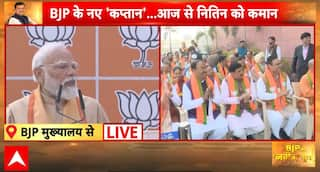How Deve Gowda Aided The Rise Of BJP In Karnataka

A couple of years ago, the Karnataka media lavished praise on HD Deve Gowda, coinciding with the silver jubilee of the veteran leader’s taking oath as prime minister in 1996. However, even as many raised a toast to the humble farmer from Haradanahalli going on to hold the highest elected office in the country, others felt Gowda’s accidental prime ministership also robbed him of a chance to serve longer as the Karnataka chief minister.
Looking back, Deve Gowda’s prime ministerial ambitions also came as a boon to the Bharatiya Janata Party (BJP) in establishing its foothold in South India. In fact, Gowda can be given the credit for aiding the BJP’s ascent to power in the state, first on account of political brinkmanship, and later as part of consolidating power and ensuring succession within the party.
For someone whose lifelong ambition to become the chief minister was finally realised in 1994, at the ripe age of 61, the term lasted all of 18 months — before an unexpected switch to the national capital. The chief ministership itself didn’t come on a platter. It was the culmination of a long wait — after first serving as Karnataka’s Leader of Opposition in 1972 and being thwarted twice from becoming CM on earlier occasions.
Karnataka Elections 2023: FULL COVERAGE
HD Deve Gowda’s Ticket To Power
Gowda’s emergence as the CM was aided by a host of political realignments preceding it. The Congress had won the mandate in 1989 with a historic margin, winning 178 of the 224 seats. But the factionalism among CM Veerappa Moily, his deputy SM Krishna, and M Rajashekar Murthy, along with the Karnataka Congress Party — a splinter party floated by ex-CM S Bangarappa — had rendered the Congress weak in 1994.
There was also a nascent BJP in the horizon, but a year before election, the Ramakrishna Hegde-led Janata Dal and Gowda’s Samajwadi Janata Party (SJD) joined hands to ensure that the merged entity stood a chance in 1994. This was engineered even as the national executives of the Janata Dal and the Chandra Shekhar-led SJD dilly-dallied on a formal merger.
The merger resuscitated Gowda’s career that was on the wane, after he made a gross miscalculation in refusing to accept the merger of the Janata Party into the Janata Dal in 1989, instead choosing to be a part of the Subramanian Swamy-led residual Janata Party. This followed Gowda’s loss from both the assembly constituencies he contested later that year, including his pocket borough of Holenarasipur.
A chastened Gowda was back in the Janata Dal soon after that — before splitting ranks once again, along with Chandra Shekhar, in 1990. This splinter party also became a rump outfit after the exit of Mulayam Singh Yadav in 1992, and the SJD faction’s merger with the Janata Dal was Gowda’s ticket to his lifelong ambition of becoming the Karnataka CM. It didn’t come easy, though. Anyhow, Hegde not contesting that election and the Janata Dal’s sweep in Vokkaliga belt proved decisive.
And, to his own credit, Gowda quickly made a name for himself as an administrator. Hegde, who didn’t stake claim to the post and opted to be a “father figure” (in the words of Biju Patnaik), had his eyes firmly set on a national role.
The victory of the Janata Dal-led front in 1996 went on to change the course of Karnataka politics.
ALSO READ | Karnataka Polls 2023: An Existential Battle For JD(S) This Time Around
The Accidental Prime Minister
When VP Singh refused to lead the government, Hegde was the frontrunner to be PM with Biju Patnaik also backing his candidature, but Gowda unexpectedly chose to throw down the gauntlet with the backing of then Janata Dal president and Bihar CM Lalu Prasad Yadav. The ascent to prime ministership was the cherry on top for Gowda’s swift political turnaround, but he didn’t stop there.
As soon as he managed to win the trust vote in the Lok Sabha, Gowda saw to it that Hegde was summarily expelled from the party, citing indiscipline, even risking the stability of the Janata Dal government in Karnataka (led by Hegde protégé JH Patel) in the process. The political brinkmanship came at a heavy price. Not only did Gowda lose prime ministership within a year, being replaced with the more congenial IK Gujral, but the Lok Shakti party floated by Hegde in the wake of his expulsion left the Janata Dal government in Karnataka tottering.
Within three years of becoming PM, Gowda was left to float the Janata Dal (Secular) [JD(S)], after the Lok Shakti and a weakened Janata Dal joined forces to form the Janata Dal (United) [JD(U)], contesting the 1999 assembly elections in alliance with the BJP. The JD(S) finished fourth with a vote share of 10 per cent and 10 seats.
Gowda’s Second Coming
If anybody thought that was going to be the end of Gowda’s political career, they had no clue about his resilience and determination. Starting from scratch, Gowda turned the fortunes of the party around by rallying the erstwhile Janata cadres. Meanwhile, the demise of Hegde and JH Patel in the interim ensured that JD(U) became a B-team of the BJP, which had emerged as the primary opposition party in 1999.
To those who asked how he could become CM again after being PM, Gowda reportedly shot back with: “Why not? Didn’t Rajaji (C Rajagopalachari) become Madras CM after serving as the governor-general of India?” Gowda was still shy of 70 when the 2004 assembly elections got underway, and he managed to pull a rabbit out of the hat by leading his party to a win in 58 seats, thereby ensuring the spoils of the power, forming an alliance government with the Congress.
That arrangement brought Gowda back to the centre stage of Karnataka politics once again, but he wasn’t going to sit back as the ‘Bhishma Pitamah’. Gowda’s elder son HD Revanna was a minister in the alliance government led by Dharam Singh, but it was the younger son, HD Kumaraswamy, who was emerging as the power centre in the party — much to the chagrin of Siddaramaiah, then a JD(S) leader and deputy chief minister.
Gowda promptly sacked Siddaramaiah and expelled him along with his supporters a couple of months later, setting the stage for Kumaraswamy to pull off a coup. Within six months, Kumaraswamy joined hands with the BJP to form a government — the saffron party’s first shot at power in South India. Gowda pretended to disown the son’s actions, although he stopped short of expelling Kumaraswamy.
Shortly thereafter, it came to light that Kumaraswamy’s expediency had the blessings of his father. The arrangement with the BJP was that both parties would share power for 20 months each. However, as the time came for JD(S) to hand over the mantle to the BJP, it developed cold feet. Gowda was worried that the Muslims backing him in the Old Mysuru region wouldn’t forgive him if he propped up a BJP government.
The resultant chaos saw the BJP riding a sympathy wave to emerge as the winner, albeit three seats short of a clear majority, in the snap election that followed in 2008 — Gowda’s refusal to fulfil the commitment given to the BJP proving decisive in the saffron party’s rise.
The JD(S) had another shot at power in 2018, when Kumaraswamy was propped up by the Congress to deny the BJP a chance to form government. And the JD(S) continues to have a presence in the Old Mysuru region even today despite the 2023 assembly election turning almost bipolar — leaving Deve Gowda to introspect if he unwittingly aided the BJP’s rise in Karnataka.
The author is a journalist and columnist based in South India.
[Disclaimer: The opinions, beliefs, and views expressed by the various authors and forum participants on this website are personal and do not reflect the opinions, beliefs, and views of ABP News Network Pvt Ltd.]




























